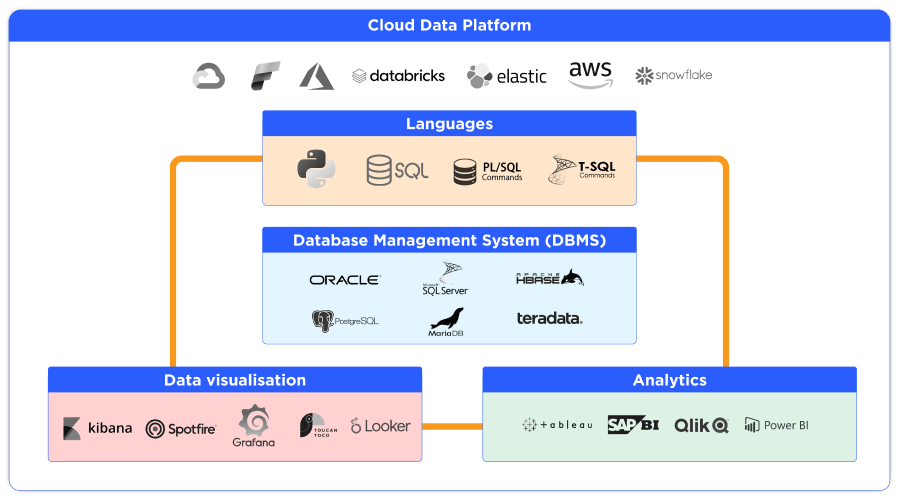>> Alter Solutions is now act digital <<
Data & AI services
Data Analytics & Business Intelligence
Leverage data visualisation tools and advanced analytics platforms to gather real-time insights that support decision-making and drive growth.
/dataanalytics_bi.webp?width=1782&height=1347&name=dataanalytics_bi.webp)
What is Data Analytics & Business Intelligence?
Data Analytics is the science of collecting, cleaning and analysing raw, unstructured data to detect patterns, behaviours and trends, turning it into valuable insights. Business Intelligence (BI), on the other hand, focuses on using those insights – structured data – to support decision-making.
Together, these fields provide businesses with real-time insights and dashboards to improve decision-making and drive growth. Therefore, Data Analytics & Business Intelligence as a service can unfold into:
- Data Analytics: dashboards, data visualisation, and reporting.
- Business Intelligence: advanced analytics platforms (Power BI, Tableau, Looker).
- Self-service Analytics: data accessibility to empower business teams.
This service is especially useful for decision-makers seeking data-driven insights, companies struggling with manual reporting, or organisations needing predictive analytics.
Data Analytics & Business Intelligence with Alter Solutions
Get to know our Data Analytics & Business Intelligence services:
Data collection, preparation and cleaning
We collect data from multiple sources, standardise formats, and establish automated workflows that continuously monitor and maintain data quality. Our team also implements robust validation rules and data quality frameworks that catch inconsistencies and errors before they impact the analysis.
Self-service BI
Empower your teams to explore data independently, create custom reports and gather insights without requiring technical expertise. Intuitive self-service tools like Power BI, Tableau, and Looker Studio create user-friendly analytics environments and democratise data access across the organisation. We also provide training and support throughout this process.
Dashboarding and data visualisation
We design and develop interactive dashboards and reports that convert complex data into clear, actionable insights, making information accessible and meaningful to all stakeholders. Our data visualisation solutions highlight key metrics, trends, and interdependencies in your data to support decision-making.
Predictive analytics and trends
By combining statistical analysis with Machine Learning techniques, we develop predictive models that analyse historical data patterns to identify emerging trends and potential opportunities. Our solutions help anticipate customer behaviour, optimise operations, and make proactive decisions.
KPI and insights identification
We work closely with your team to define Key Performance Indicators (KPIs) that align with business objectives. Our experts extract the best insights from your data, establish performance benchmarks, and create monitoring systems that track progress toward your goals.
The benefits of Data Analytics & Business Intelligence

Actionable insights
Data analytics transforms raw information into actionable insights, enabling businesses to make smarter, evidence-based decisions that drive growth, improve efficiency, and seize market opportunities effectively.
Customer understanding
Advanced analytics provides a deeper understanding of customer behaviours and preferences, allowing businesses to deliver personalised experiences, build loyalty, and anticipate needs with data-driven precision.
Performance monitoring
Real-time dashboards and analytics tools empower businesses to track KPIs, quickly identify trends, and proactively address issues, ensuring alignment with strategic objectives and operational goals.Predictive capabilities
Predictive analytics leverages historical data to forecast trends and outcomes, helping businesses anticipate market changes, optimise operations, and reduce risks in decision-making processes.
Our technical expertise

Getting started with Data Analytics & Business Intelligence
act digital can help you implement a successful Data Analytics & Business Intelligence strategy. Here’s how:
#1
Needs analysis and proposal
We conduct stakeholder interviews to identify key business needs and reporting requirements. We also assess your current data landscape, available sources, and technical infrastructure to determine the optimal analytics approach.
#2
Dashboard and report design
We develop wireframes and prototypes, incorporating user feedback to ensure the final design is intuitive, accessible and meets all stakeholder needs.
#3
Data preparation and processing
This is when we lay the foundation for data analytics by implementing robust data processing workflows. Our team develops and optimises SQL queries and data transformation procedures, ensuring efficient data retrieval and processing.
#4
Deployment and user training
We take care of technical implementation while minimising disruption to your operations. We provide training tailored to different user groups, from basic dashboard navigation to advanced self-service analytics.
Our delivery models
Consulting & Audit
Whether you need analytics audits, BI tool evaluations, or strategic guidance for data-driven decision-making, our experts collaborate closely with your organisation to assess your analytics capabilities, processes, and technologies. We deliver actionable insights and strategic recommendations tailored to your business needs, including detailed assessments, roadmaps, and best practices for enhancing your data analytics and BI initiatives.Team scaling
Reinforce your existing teams with our experienced data experts. This Time model allows you to quickly adjust team size based on project demands. Our experts work as an extension of your team, following your processes and methodologies while bringing fresh perspectives and specialised expertise. It’s the perfect approach for organisations needing to temporarily boost their analytics, reporting, or dashboard development capabilities.Professional Services
End-to-end project delivery with defined scope, timelines, and outcomes. We take full responsibility for the project success, from initial planning through implementation and deployment. This model provides predictable costs and clear deliverables, making it ideal for organisations seeking turnkey solutions.On-site or Nearshore
We can adapt our delivery model to your specific needs. Our on-site experts integrate directly with your teams to implement and optimise data solutions. For organisations seeking cost-effective alternatives without compromising quality, our Nearshore model provides experienced teams in compatible time zones, ensuring effective collaboration and communication.Why act digital?
Proven track record in BI & analytics projects
Our team has successfully implemented analytics solutions for multiple organisations of different sectors and sizes. We have helped them transform their data into strategic assets, reduce operational costs and identify new opportunities. Each project has enriched our methodology and best practices, allowing us to anticipate and address common challenges.
Expertise in data storytelling & visualisation
By combining technical expertise with design thinking, our team creates intuitive, engaging and effective data visualisations that make insights accessible to all stakeholders. Our approach is clear: data storytelling goes way beyond charts and graphs – it’s about creating a narrative that connects data to business outcomes.
Agnosticism
We maintain complete independence in our technology recommendations, focusing solely on what’s the best fit for your business needs, budget and infrastructure.
Strategic partnerships
Our certified partnerships with leading Cloud & Data providers give our clients access to the best solutions in the market. We maintain strong relationships with Google, Microsoft, Qlik, Elastic, and Snowflake. These partnerships guarantee expert support, deep product knowledge and direct access to other resources.
Other Data & AI services
We operate across the entire data processing chain with other services like:
Our Articles
Contact us today
Fill in our contact form and our dedicated Data & AI team will get back to you within 24 hours.
You can also e-mail us with more information about your project and requirements.




